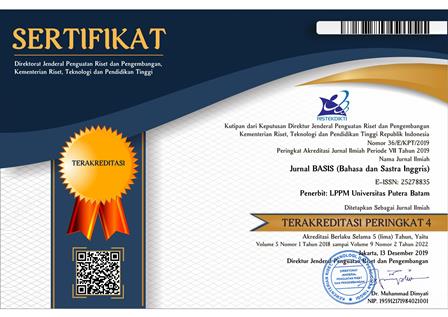THE STRATEGIES OF POLITENESS USED BY THE AMBONESE IN REFUSING INVITATIONS
DOI:
https://doi.org/10.33884/basisupb.v8i1.3687Keywords:
Strategies, Politeness, Refusals, Invitations, AmboneseAbstract
The aims of this research is to determine the strategies of politeness refusal used by the Ambonese in refusing invitations, and to determine the effects of social relationship towards the strategies of politeness used by the Ambonese in refusing invitations, The research used a descriptive qualitative approach. The data were collected from direct observation by recording the conversations in any situation between the interlocutors. The data were analyzed based on Yassi’s six models of politeness system, and classifies the strategies of politeness which are formulated by Brown and Levinson, The results show that Ambonese speakers mostly use long refusal sequences, In the interaction between the strangers, Ambonese speakers tend to use bald on record strategy such as direct refusal as a head act of refusals sequence, In intimate relationship, Ambonese speakers tend to combine addressed form, reason, promise, joke or offer new solution as positive politeness strategy. In hierarchal relationship, Ambonese speakers tend to use negative politeness strategies such as give deference and expressing apology by an inferior to a superior person, Culturally, Ambonese people tend to be influenced by Pela gandong to maintain the solidarity in responding and addressing.
References
Azwan. (2018). Politeness Strategies of Refusals to Request used by Ambonese Community. LINGUA, Volume15, No. 1. Surakarta.
Brown P. & Levinson S. (1987). Politeness: Some language universals in language use. Cambridge: Cambridge University Press.
Nadar F. X. et al. (2006). “Penolakan dalam Bahasa Inggris dan bahasa Indonesia, Kaqjian Praagmatik tentang Realisasi Strategi Kesopanan berbahasa” Disertation. Yogyakarta: Gajah Mada University.
Nelson G.L., Batal M.A., & Bakary W.E. (2002). Cross-Cultural Pragmatics: Strategy Use in Egyptian Arabic and American English Refusals. Applied Linguistics, 23/2, pp. 163-189.
Sattar et al. (2011) Refusal Strategies in English Used by Malay University Students. GEMA Online Journal of Language Studies Volume 11(3).
Scollon R. & Scollon S. B. K. (1995). Intercultural communication: A discourse approach. Oxford, Cambridge: Blackwell.
Tanck S. (2003). Speech acts sets of refusals and complaint: A comparison of native and non-native English speakers’ production. TESL Second Language Acquisition,1-22.
Turnbull W. & Saxton K. L. (1997). Modal expressions as facework in refusals to comply with requests: I think I should say ‘no’ right now. Journal of Pragmatics27: 145-181.
Yassi A. H. (2012). Negating and Affirming a proposition in Makassarese: Universality of Brown and Levinson Politeness Theory in F. Rahman (ed) Kebahasaan, Sas tra dan Pendidikan. International seminar Proceeding. FIB, Hasanuddin University, Makassar.
Downloads
Published
Issue
Section
License

















